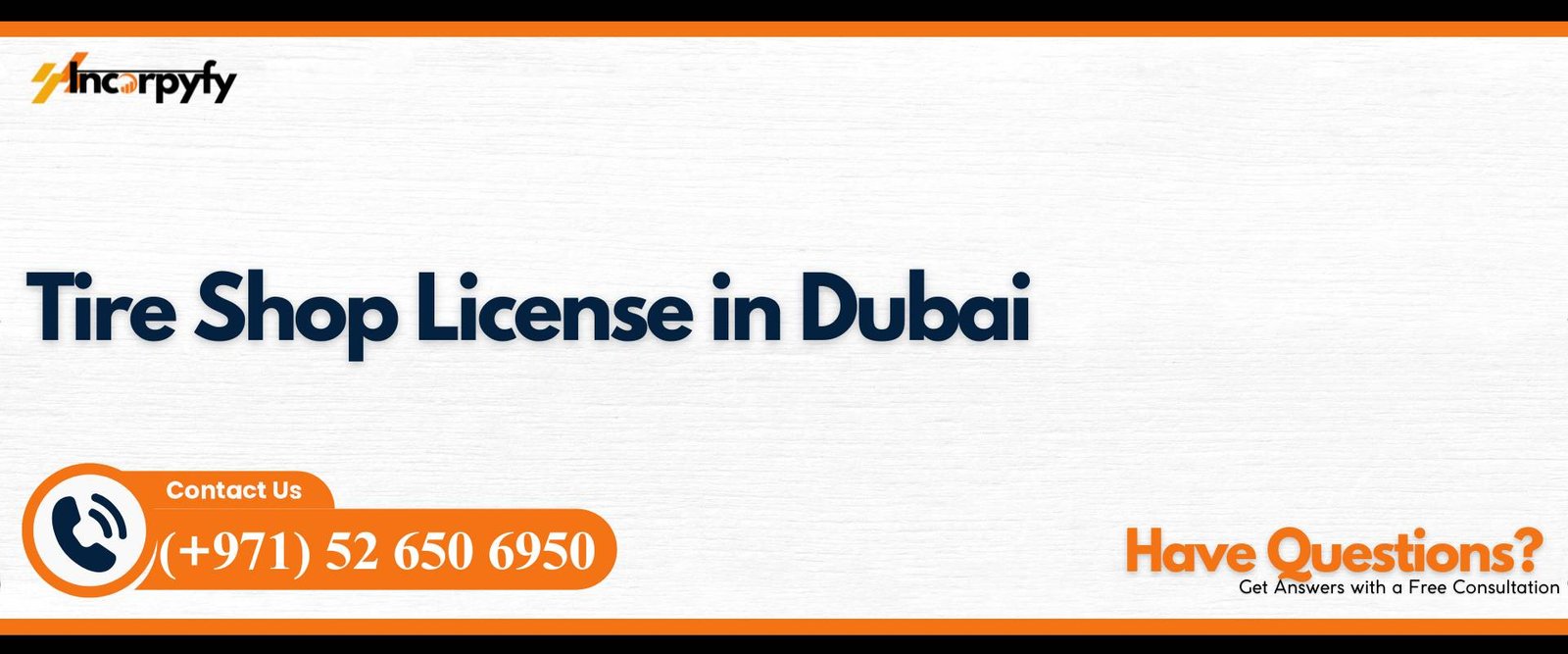
Dubai’s rapidly expanding automotive industry presents lucrative opportunities for entrepreneurs looking to establish a tire shop business. With over 3 million vehicles registered in the UAE and growing vehicle maintenance demands, obtaining a tire shop license in Dubai has become an increasingly attractive business opportunity. The tire retail market in Dubai continues to flourish due to the emirate’s position as a regional automotive hub and the constant need for tire replacement services.
Understanding the licensing requirements, regulatory compliance, and business setup procedures is crucial for success in Dubai’s competitive tire industry. This comprehensive guide will walk you through every aspect of obtaining your tire shop license, from initial application procedures to ongoing compliance requirements, ensuring your automotive business operates legally and profitably in this dynamic market.
Understanding Dubai’s Tire Shop Licensing Requirements
The tire shop licensing framework in Dubai is designed to ensure quality standards, consumer protection, and environmental compliance within the automotive retail sector. Dubai Economic Department (DED) serves as the primary licensing authority for tire retail businesses, while Dubai Municipality oversees environmental regulations and waste management compliance.
Primary Licensing Authorities and Their Roles
Dubai Economic Department handles all commercial license applications for tire shops and automotive retail businesses. They evaluate business plans, verify financial requirements, and ensure compliance with commercial regulations. The DED licensing process typically involves document verification, background checks, and facility inspections before license approval.
Dubai Municipality plays a crucial role in environmental compliance and waste management regulations for tire businesses. They oversee tire disposal requirements, recycling protocols, and environmental impact assessments. Municipal permits are mandatory for tire storage facilities and automotive service centers.
Types of Tire Shop Licenses Available
Retail tire shop licenses cover businesses focused on tire sales and basic installation services. This license category is suitable for showroom-style operations and tire retail outlets without extensive automotive repair services. Inventory management and customer service are primary focus areas for this business model.
Comprehensive automotive service licenses include tire sales, wheel alignment, balancing services, and automotive repairs. This expanded license allows for full-service operations and higher revenue potential but requires additional technical qualifications and equipment investments. Service bay requirements and specialized tools are necessary for this license type.
Regulatory Compliance Standards
Quality standards for tire retailers include product authenticity verification, manufacturer warranties, and safety certifications. All tire products must meet UAE standards and carry approved certifications from international quality organizations. Counterfeit tire prevention is a key regulatory focus in Dubai’s automotive market.
Environmental regulations mandate proper tire disposal, recycling compliance, and waste management protocols. Used tire collection, eco-friendly disposal methods, and environmental impact reporting are required for license maintenance. Sustainability practices are increasingly important for long-term business viability.
Documentation and Record Keeping Requirements
Comprehensive documentation includes supplier agreements, product certificates, inventory records, and sales documentation. Traceability systems for tire products help ensure quality control and regulatory compliance. Digital record keeping is recommended for efficient management and regulatory reporting.
Customer service records, warranty documentation, and service history logs demonstrate professional operations and customer care standards. Staff training records and technical certifications show competency levels and professional development. Regular documentation audits help maintain compliance standards.
Business License Application Process
The tire shop license application involves multiple stages and requires careful preparation of documentation and compliance materials. Understanding the step-by-step process helps streamline application procedures and avoid common application delays.
Initial Application Preparation
Business name reservation is your first step in the licensing process. Choose a professional business name that reflects your tire shop concept while complying with UAE naming regulations. Trademark searches and name availability checks prevent legal complications and application rejections.
Business plan development should detail your target market, service offerings, financial projections, and operational strategy. Include market analysis, competition assessment, and growth projections to demonstrate business viability. Professional business plans strengthen license applications and investor confidence.
Required Documentation Submission
Passport copies and Emirates ID for all business partners are mandatory identification documents. Educational certificates, professional qualifications, and experience letters demonstrate competency in automotive retail or business management. Character certificates and police clearances may be required for background verification.
Financial documentation includes bank statements, financial guarantees, and capital verification letters. Proof of funds and investment capability are crucial for license approval. Audited financial statements (if applicable) and credit references strengthen financial credibility.
Facility Inspection and Approval
Location approval involves site inspections by municipal authorities to verify zoning compliance and facility suitability. Commercial zoning certificates and building permits must be in place before business operations. Accessibility compliance and safety standards are evaluated during facility inspections.
Infrastructure assessments cover electrical systems, storage facilities, customer areas, and service bays (if applicable). Fire safety systems, emergency exits, and safety equipment must meet commercial standards. Parking facilities and vehicle access are important for customer convenience.
License Issuance and Activation
Final approval and license issuance typically occur within 2-4 weeks after successful inspections and documentation approval. License fees payment and municipality permits must be completed before business commencement. Trade license validity is usually one year with annual renewal requirements.
Business registration with relevant authorities and tax registration complete the licensing process. VAT registration is mandatory for businesses with annual turnover exceeding AED 375,000. Chamber of Commerce membership provides networking opportunities and business support services.
Location and Infrastructure Requirements
Selecting the right location and establishing proper infrastructure are critical factors for tire shop success. Strategic location planning impacts customer accessibility, operational efficiency, and long-term profitability.
Zoning and Location Compliance
Commercial zoning is mandatory for tire shop operations in Dubai. Industrial zones, commercial districts, and designated automotive areas are typically approved for tire retail businesses. Mixed-use developments may allow tire shops but require specific permits and noise compliance.
Location accessibility includes major road connectivity, public transportation access, and customer parking availability. High-traffic areas and automotive corridors provide better visibility and customer flow. Proximity to residential areas and commercial centers influences market reach.
Space and Layout Requirements
Minimum space requirements for tire shops typically range from 200-500 square meters depending on inventory levels and service offerings. Showroom areas, storage facilities, customer waiting areas, and office spaces must be clearly defined in facility layouts. Expandability options should be considered for future growth.
Storage specifications include tire racking systems, climate control (where necessary), and inventory organization. Different tire categories require separate storage areas for efficient management. Security systems protect valuable inventory from theft and damage.
Utility and Infrastructure Setup
Electrical requirements include adequate power supply for lighting, equipment operation, and customer facilities. Compressed air systems for tire inflation and pneumatic tools are essential infrastructure components. Emergency power backup ensures continuous operations during power outages.
Water and drainage systems support facility cleaning and basic operations. Waste management infrastructure handles packaging materials and operational waste. Internet connectivity supports point-of-sale systems, inventory management, and customer service operations.
Safety and Security Infrastructure
Fire safety systems including smoke detectors, fire extinguishers, and emergency exits are mandatory safety requirements. First aid facilities and safety equipment ensure staff and customer safety. Emergency evacuation plans and safety training demonstrate safety commitment.
Security systems include CCTV surveillance, alarm systems, and access control measures. Inventory security and cash handling security protect business assets. Insurance coverage for property, inventory, and liability provides financial protection.
Equipment and Technical Requirements
Tire shop operations require specialized equipment and technical capabilities to provide professional services and maintain competitive standards. Equipment investments significantly impact operational efficiency and service quality.
Essential Tire Handling Equipment
Tire mounting machines are fundamental equipment for tire installation and removal services. Professional-grade machines ensure efficient operations and minimize tire damage during service procedures. Different machine types accommodate various tire sizes and wheel configurations.
Wheel balancing equipment provides precision balancing services that enhance vehicle performance and tire longevity. Digital balancing machines offer accurate measurements and professional results. Regular calibration and maintenance ensure consistent service quality.
Specialized Service Equipment
Tire pressure monitoring systems help provide accurate inflation services and pressure monitoring. Professional air compressors deliver consistent air pressure for tire inflation and pneumatic tool operation. Pressure gauges and inflation equipment are essential service tools.
Wheel alignment equipment (for full-service operations) provides comprehensive automotive services and additional revenue streams. Alignment machines require significant investment but offer higher profit margins and customer retention benefits. Technical training is essential for equipment operation.
Inventory Management Systems
Digital inventory systems track tire stock, sales data, and reorder requirements. Barcode scanning and automated tracking improve inventory accuracy and operational efficiency. Real-time inventory updates prevent stockouts and overstock situations.
Point-of-sale systems integrate sales processing, inventory management, and customer information. Payment processing capabilities include cash, card payments, and digital wallets. Sales reporting and analytics support business decision-making.
Quality Control and Testing Equipment
Tire inspection tools help assess tire condition, tread depth, and safety standards. Professional inspection services add value and demonstrate customer care. Tire pressure gauges, tread depth meters, and visual inspection tools are essential quality assurance equipment.
Testing equipment for wheel balancing and alignment verification ensures service accuracy. Calibration tools and measurement devices maintain equipment precision. Regular testing and quality checks build customer confidence and service reputation.
Financial Requirements and Investment Planning
Understanding the financial commitments and investment requirements for a tire shop license helps entrepreneurs plan adequate funding and ensure business sustainability. Comprehensive financial planning is crucial for long-term success.
Licensing and Permit Costs
Trade license fees for tire shops typically range from AED 15,000 to AED 30,000 annually, depending on business activity scope and company structure. Municipality permits and environmental clearances add AED 3,000 to AED 8,000 to initial costs. License renewal fees are generally lower than initial application costs.
Professional consultation fees for licensing assistance range from AED 5,000 to AED 15,000 depending on service complexity and consultant expertise. Document preparation, application processing, and compliance support are included in professional service packages. DIY applications save consultation fees but require significant time investment.
Infrastructure and Setup Investment
Facility setup costs including interior design, storage systems, and customer areas typically require AED 50,000 to AED 150,000 investment. Showroom displays, tire storage racks, and customer facilities impact business presentation and customer experience. Professional setup enhances brand image and market positioning.
Equipment investments for basic operations range from AED 30,000 to AED 100,000 depending on service scope and equipment quality. Tire mounting machines, balancing equipment, and basic tools are minimum requirements. Advanced equipment increases service capabilities but requires higher investment.
Working Capital and Operational Funding
Initial inventory investment varies significantly based on tire brands, size range, and target market. Budget AED 100,000 to AED 300,000 for well-stocked operations covering popular tire sizes and brands. Supplier agreements and payment terms impact cash flow and inventory management.
Working capital for 3-6 months of operational expenses ensures business continuity during startup phases. Staff salaries, rent payments, utility bills, and operational costs require adequate funding. Cash flow projections help determine working capital needs.
Financing Options and Investment Sources
Bank financing options include business loans, equipment financing, and working capital facilities. UAE banks offer competitive rates for established businesses with solid business plans. Collateral requirements and personal guarantees are common loan conditions.
Investor partnerships and franchise opportunities provide alternative funding sources with shared expertise and brand recognition. Partnership agreements should clearly define roles, responsibilities, and profit sharing. Franchise support includes training, marketing, and operational guidance.
Ongoing Compliance and Business Operations
Maintaining tire shop operations requires continuous compliance with regulatory requirements and industry standards. Operational excellence and regulatory adherence ensure long-term business success.
Regular Inspection and Compliance Monitoring
Annual inspections by Dubai Municipality and DED assess ongoing compliance with licensing conditions. Facility maintenance, safety standards, and operational procedures are evaluated during regulatory visits. Compliance documentation and record keeping demonstrate professional operations.
Environmental compliance includes tire disposal reporting, waste management audits, and recycling compliance verification. Monthly reports and annual assessments track environmental impact and sustainability practices. Non-compliance penalties can impact business operations and license validity.
License Renewal and Updates
Annual license renewals require updated documentation, compliance certificates, and fee payments. Business activity changes or facility modifications must be reported and approved before implementation. Timely renewals prevent operational disruptions and legal complications.
Document updates include Emirates ID renewals, passport updates, and visa changes for business partners. Financial statements and audit reports may be required for renewal processes. Professional assistance helps ensure smooth renewals and continued compliance.
Staff Training and Development
Technical training for tire installation, balancing, and customer service ensures professional service delivery. Manufacturer training programs and industry certifications enhance staff competencies and service quality. Regular training updates keep staff current with industry developments.
Safety training covers equipment operation, workplace safety, and emergency procedures. First aid training and safety protocols protect staff and customers. Training records and certification maintenance demonstrate professional development.
Quality Assurance and Customer Service
Service quality standards include installation procedures, customer communication, and after-sales support. Quality control checklists and service protocols ensure consistent service delivery. Customer feedback systems help identify improvement opportunities and maintain service standards.
Warranty management and customer complaint resolution build customer trust and business reputation. Professional handling of warranty claims and service issues demonstrates commitment to quality. Customer satisfaction directly impacts business growth and market reputation.
Conclusion
Establishing a successful tire shop business in Dubai requires careful planning, adequate investment, and thorough understanding of regulatory requirements. The tire retail market in Dubai offers significant opportunities for well-prepared entrepreneurs who can provide quality products and professional services to the emirate’s growing automotive market.
Regulatory compliance, strategic location selection, and professional operations are fundamental to long-term success in Dubai’s competitive tire industry. Investment in quality equipment, staff training, and customer service creates sustainable competitive advantages and business growth opportunities.
The licensing process, while comprehensive, is designed to ensure industry standards and consumer protection. Professional preparation and expert guidance significantly improve application success rates and reduce processing delays. Ongoing compliance and operational excellence maintain business sustainability and growth potential.
For entrepreneurs seeking professional support throughout their tire shop establishment journey, Business Setup Consultants in Dubai, UAE provide comprehensive assistance from initial planning through operational launch. Their expertise in licensing procedures, regulatory compliance, and business setup helps ensure successful outcomes and long-term business sustainability.
Frequently Asked Questions (FAQs)
What is the minimum investment required for a tire shop license in Dubai?
The minimum investment typically ranges from AED 200,000 to AED 500,000, including licensing fees, equipment, initial inventory, and working capital. Actual costs vary based on business scope, location, and service offerings. Professional consultation helps determine accurate investment requirements.
How long does it take to obtain a tire shop license in Dubai?
The licensing process typically takes 4-8 weeks from application submission to final approval, assuming complete documentation and facility readiness. Inspection scheduling and approval procedures may extend processing times during peak periods. Professional assistance can expedite the application process.
Can foreign nationals own 100% of a tire shop business in Dubai?
Foreign ownership options depend on business location and structure. Mainland operations typically require UAE national sponsors, while free zone establishments allow 100% foreign ownership. Recent regulatory changes have expanded opportunities for foreign investors in certain business categories.
What are the ongoing compliance requirements for tire shops?
Ongoing compliance includes annual license renewals, regular inspections, environmental reporting, and staff training maintenance. Inventory management, quality standards, and customer service protocols must be continuously maintained. Professional consultation helps ensure ongoing compliance.
Are there restrictions on tire brands I can sell?
Tire retailers can generally sell any brands that meet UAE quality standards and carry proper certifications. Counterfeit products are strictly prohibited, and authentic products with manufacturer warranties are required. Supplier verification and product authentication are important compliance aspects.
Do I need specialized training to operate a tire shop?
While formal training isn’t legally mandatory, technical knowledge of tire installation, balancing, and automotive systems is highly recommended. Manufacturer training programs and industry certifications enhance service quality and customer confidence. Staff training is essential for professional operations.
What insurance coverage is required for tire shops?
Mandatory insurance includes general liability, product liability, and commercial property coverage. Professional indemnity and business interruption insurance are recommended for comprehensive protection. Insurance requirements vary based on business size and service scope.
Can I combine tire sales with other automotive services?
Combined operations are possible with appropriate licensing and facility requirements. Additional services like oil changes, brake repairs, or automotive accessories require expanded licenses and specialized equipment. Service diversification can increase revenue but requires additional investment and compliance requirements.






